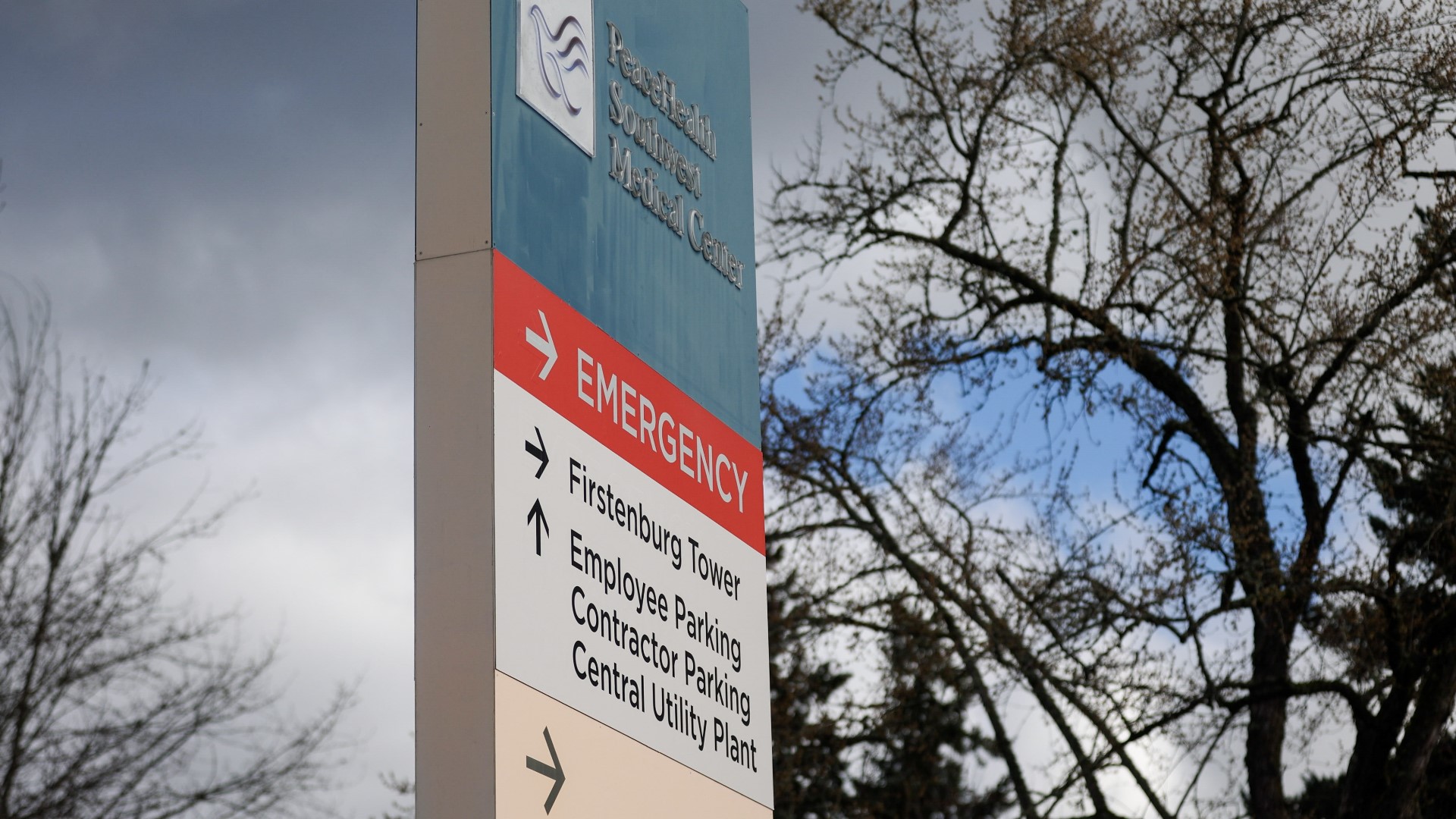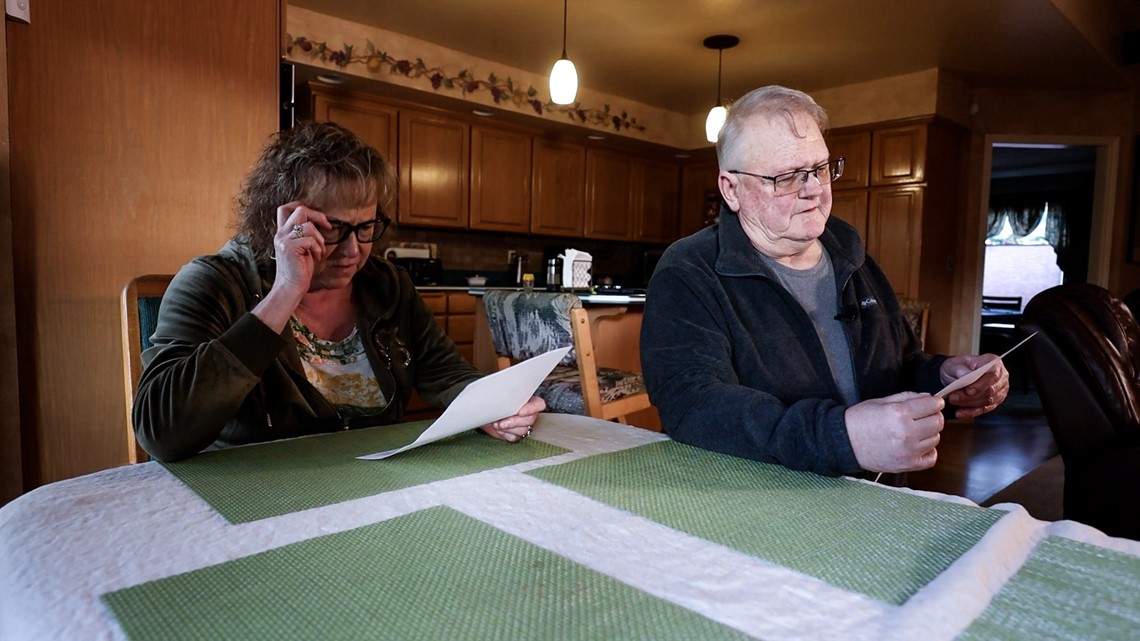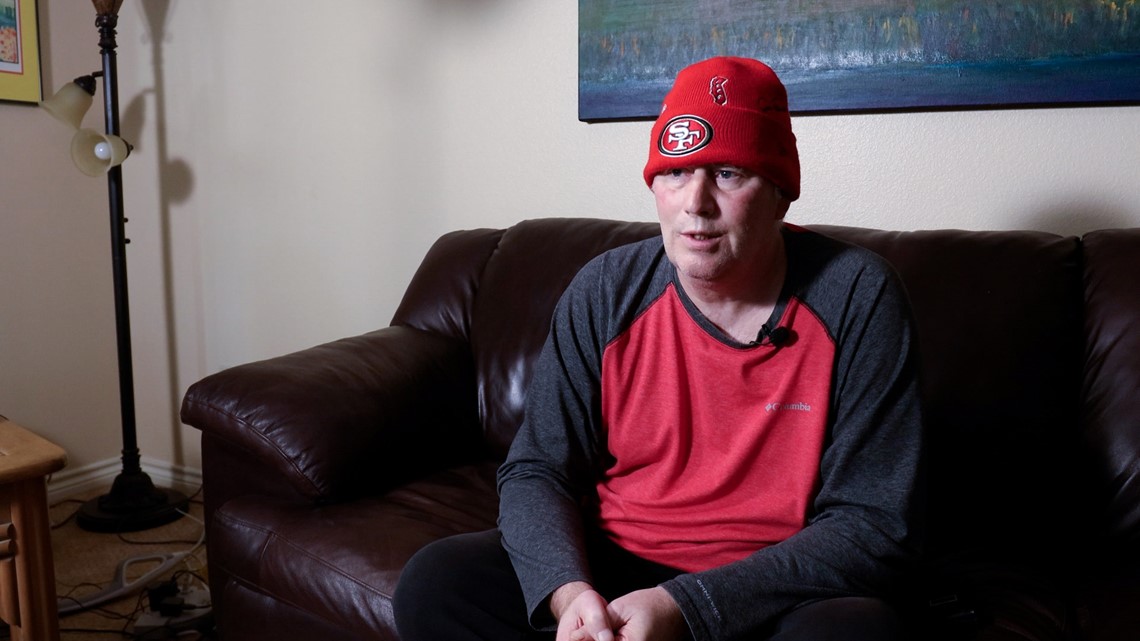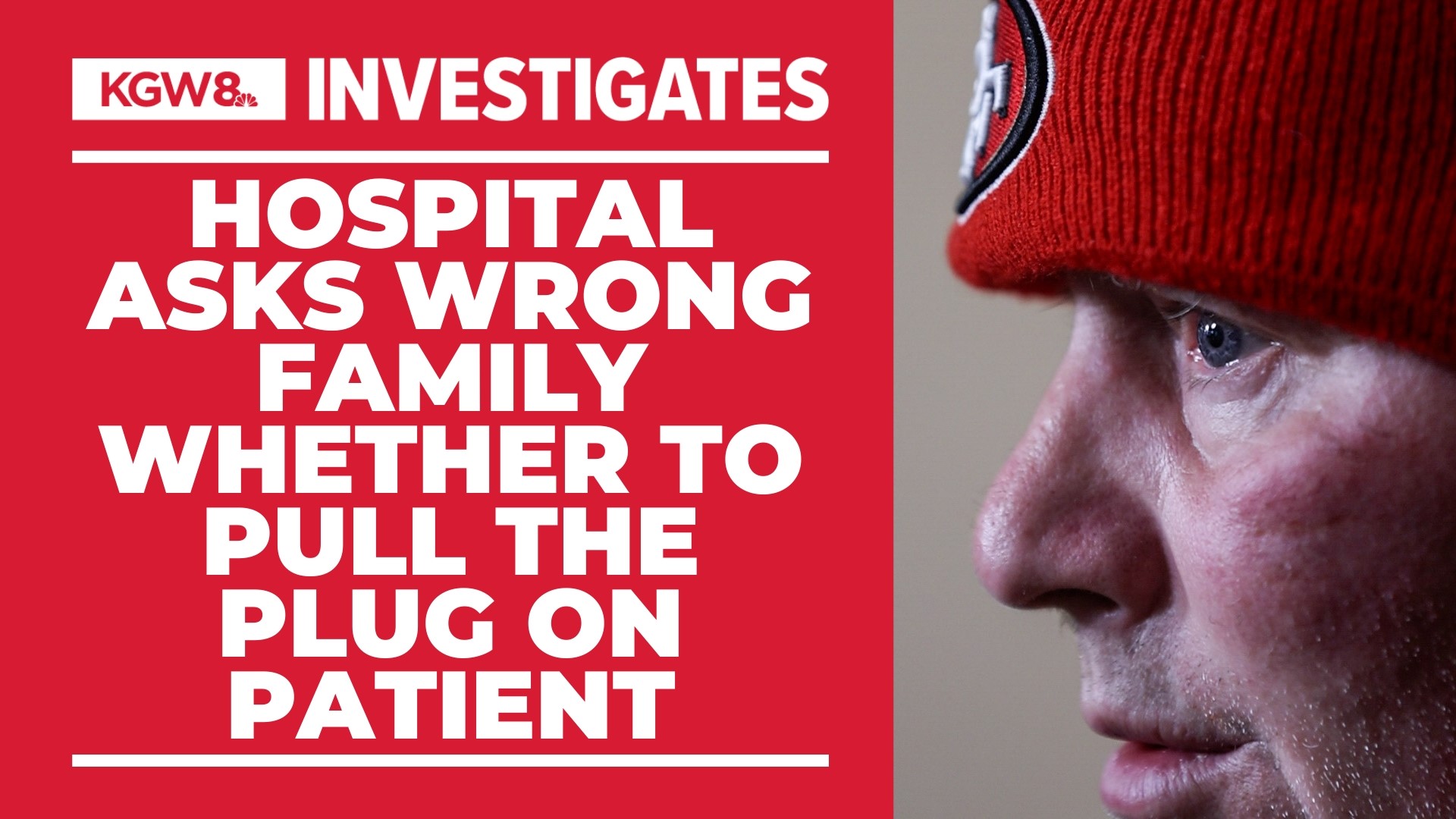Vancouver hospital asked wrong family whether to pull the plug on patient
In a terrible case of mistaken identity, KGW found PeaceHealth Southwest Medical Center in Vancouver allowed a family to pull the plug on the wrong man.

The family of a Vancouver man faced a heavy decision after an unexpected phone call in the middle of the night. Their loved one was on life support, hospital staff told them, after a horrible choking incident.
“They said, 'He’s basically brain dead,'” explained Debbie Danielson. “'Do you want us to keep him on life support or do you want to pull the plug?'”
After a brief discussion with her husband, Danielson told the hospital to pull her 60-year-old brother off life support.
“Michael A. Beehler, 60, Vancouver, died August 9, 2021,” read a death notice posted in The Columbian newspaper.
“That whole week was kind of a blur. Trying to come up with funeral arrangements, letting family members know that he passed away,” explained Danielson.
Then came the phone call no one expected. It was her brother, Mike. He wasn’t dead. Instead, he was very much alive.
“I said, ‘You can’t be alive. You’re dead!'” explained Danielson.
In a terrible case of mistaken identity that has never been publicly disclosed, KGW found PeaceHealth Southwest Medical Center in Vancouver allowed a family to pull the plug on the wrong man.
“We made life-ending decisions for a person we don’t even know,” said Danielson’s husband, Gary.


The medical mix-up started with a 911 call on August 8, 2021. Medics responded to an apartment in Vancouver. Mike Beehler said his roommate choked on a piece of steak at dinner. The man was not breathing and unconscious, according to an emergency dispatch log.
“He fell over a chair,” said Beehler. “I thought he was dead then.”
An ambulance transported the man to PeaceHealth Southwest Medical Center in Vancouver. But, somewhere along the line, the roommate was misidentified, and the hospital incorrectly treated him as Mike Beehler.
“How do you misidentify somebody?” asked Danielson.
His family claims Beehler had previously been treated at PeaceHealth Southwest Medical Center and had medical files on record, which may help explain why the hospital knew to call his sister with dire news.
PeaceHealth Southwest Medical Center called the county medical examiner’s office to report the death, then sent the misidentified body to the funeral home, according to emails from the Clark County Medical Examiner’s Office obtained through a public records request.
The funeral home asked the wrong family about final wishes, cremation and organ donation.
“When we went to the funeral director, I was like, ‘Don’t we need to identify him?’ 'No, we’ll just take it from here,'” recounted Beehler’s brother-in-law, Gary Danielson. All County Cremation and Burial Services declined to comment.
It wasn’t until Beehler made that unexpected call to his sister a week later, concerned because his cell phone account had been shut down, that anyone realized the roommates had been switched at death.
“He’s dead and I’m supposed to be dead. Who knows what’s going on,” explained Beehler.


On Saturday evening, August 14, 2021, Beehler’s family called police non-emergency to notify authorities about the mistake.
In an email to the medical examiner’s staff, a death investigator summarized the situation and explained how any errors couldn’t be corrected immediately due to the weekend and limited staffing.
“I am a little uncertain on how to proceed with this unfortunate mix-up,” wrote death investigator Michelle Rodrigue.
The Clark County Medical Examiner’s Office said it later retrieved the body from the funeral home, conducted an external examination and used fingerprints to confirm the person’s identity. Indeed, it wasn’t Beehler, the medical examiner found. It was his roommate who died.
A new death notice was published in the newspaper remembering the roommate. “David C. Wells, 69, Vancouver, died Aug. 9, 2021,” read the notice.
No explanation Family wasn't told of mix-up
The Clark County Medical Examiner’s Office then notified Wells' next-of-kin, his son in California.
“They basically told me there was a medical emergency regarding my father. He had been pronounced dead,” said Shawn Wells.
At the time, nobody told him about the mix-up — not the medical examiner, not the hospital or the funeral home, explained Shawn.
He travelled from his home in San Jose to make funeral arrangements in Vancouver. Shawn said he paid All County Cremation and Burial Services to retrieve the body so he could spend a few precious moments with his late father. He said a prayer. Then, he held the phone near his father’s body so other family members could say their final good-byes.
Shawn returned to California with his father’s cremated remains — unaware of the mix-up.
It wasn’t until KGW senior investigative reporter Kyle Iboshi contacted Wells’ family, more than two years after his death, that they discovered their loved one had been misidentified. He was taken off life support by strangers.
“I'm at a loss for words how badly they handled this,” said Shawn. “I'll never be able to get that decision back.”
Shawn explained his father had a distinct tattoo on his arm, which could have raised red flags if comparisons were made between the patient and medical files.
“It would have been a very easily identifiable mark on his body. Even if there was any slight confusion about his identity, I think it would have been quickly resolved,” said Shawn.


Shawn said he’s since gone back and looked through paperwork surrounding his father’s death. The only mention of misidentification he could find was in the coroner’s report, which he hadn’t previously opened fearing the grim details of his father’s death. Beyond that, Shawn said, there’s been no explanation or apology.
“It’s disturbing. I don't know if I'm going to get over it. They dropped the ball so egregiously,” said Shawn.
Beehler’s family explained that they too have been met with silence.
“I still don’t know what happened,” said Gary Danielson. “We never got an explanation. We never got a sorry or anything.”
PeaceHealth declined to answer any questions or explain the mix-up, citing federal patient privacy law.
As a result of the case, the Clark County Medical Examiner’s office changed its internal policy, according to a county spokesperson. It now requires funeral homes, health care facilities or other providers requesting death certification to have family members identify their loved ones. If family identification isn’t possible, the decedent is brought to the medical examiner’s office for other forms of identification, including fingerprinting.
Apology and review When mistakes are made
When health care mistakes are made, it is important to apologize, explained Dr. Thomas Gallagher, a practicing internist and researcher of patient safety and medical ethics at the University of Washington.
“Anytime something goes wrong in healthcare, it really is important that the practitioners and the organization proactively reach out to the patient and the family to let them know what happened, to explain what took place and to apologize,” said Gallagher.
Traditionally, health care organizations have avoided disclosing errors following the advice of their risk managers and attorneys worried about litigation, embarrassment or damage to reputation.
Gallagher believes health care providers are obligated to do their own internal reviews when something goes wrong to determine if anything could have been done differently going forward to prevent recurrences.
“You can really tell pretty quickly whether organizations are committed to learning and transparency and accountability or more interested in hiding things and protecting their reputation when you look at how they respond to harm events,” said Gallagher.
A PeaceHealth spokesperson wouldn’t say if there was any type of internal review into the mix-up between roommates.
Serious medical errors can be investigated by the Washington Medical Commission and the Washington Department of Health, but those events typically must meet the definition of an adverse event. Since the misidentification wasn’t associated with a surgery or invasive procedure, it likely wouldn’t count as a serious reportable event triggering a state investigation. Both the Washington Medical Commission and Washington Department of Health found no record of an investigation.
Another case Coming to light
This medical mix-up came to light after Beehler’s family saw a KGW report involving the misidentification of another deceased man in Portland. In September, the Multnomah County Medical Examiner’s Office notified the family of Tyler Chase, 22, that he’d died of a drug overdose. Three months later, the office discovered the Portland man was still alive.
The Multnomah County Medical Examiner said misidentification occurred because the dead man, later identified by his family as Matthew Taylor, 30, was carrying Chase’s wallet and temporary driver’s license.
KGW INVESTIGATES: Multnomah County officials told a man's family he had died. Three months later, they learned he was still alive
Patient misidentification What happened?
Patient misidentification can happen for a variety of reasons. Some patients arrive at the emergency room with no identification or can’t tell hospital staff their name because they’re unconscious or dealing with mental health challenges. In some situations, patients don’t want to give a name or provide the wrong name on purpose due to law enforcement or immigration concerns.
“Health care organizations go to great lengths to try and make sure they have the appropriate patient identification,” said Gallagher. “Most patients get a little tired of being asked, ‘What’s your name? What’s your date of birth?”
Incidents involving misidentification of the dead are rare, although there have been headline-grabbing cases reported in California, New York, Illinois and Indiana.
The number of people involved in a patient’s treatment — including police, firefighters, medics, doctors and nurses — can also lead to mistakes.
Beehler and his family theorize that someone may have mixed up the identities of the two roommates while responding to the initial 911 call.
“They checked my ID. That was about it,” recalled Beehler.
According to the 911 dispatch log, several people could be heard talking in the apartment. A neighbor tried to help.
“We ran around like chickens with our heads cut off,” said Beehler, describing the chaotic scene before medics transported his roommate to the hospital.
“If patients come into our Emergency Department as a trauma or directly from EMS, and they have no ID, they are given a trauma name until proof of identity is confirmed,” wrote Debra Carnes, spokesperson for PeaceHealth Southwest Medical Center in an email to KGW. Carnes declined to provide specific details.
Beehler’s family thought they’d lost their loved one for good, taking him off life support; only to learn the shocking truth: it was a stranger. Yet nobody will explain how it happened or why.
“It’s a pretty messed up situation,” said Beehler. “Somebody messed up.”


